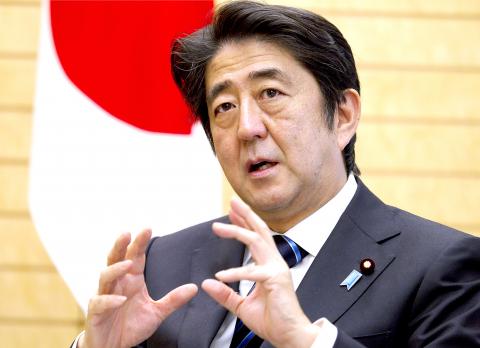|
Japanese PM calls for
summit with China¡¦s Xi Jinping
Agencies, BEIJING and WASHINGTON

Shinzo Abe, Japan¡¦s prime
minister, speaks during an interview in Tokyo, Japan, on Friday.
Photo:Bloomberg
Japanese Prime Minister Shinzo Abe called
for a summit with Chinese President Xi Jinping (²ßªñ¥) to reset relations after an
escalation in bilateral tensions, invoking a 2006 visit to Beijing during his
first administration.
¡§Since there are issues, it is all the more important to have a leaders¡¦
meeting,¡¨ Abe said in an interview in the prime minister¡¦s official residence in
Tokyo. ¡§I visited China as prime minister and met with [former Chinese
president] Hu Jintao (JÀAÀÜ) and we shared the view that we should develop our
ties based on a strategic, mutually beneficial relationship. Now is the time to
go back to that starting point.¡¨
Abe¡¦s call on Friday is his most explicit yet for a summit since China¡¦s
declaration last month of an air defense identification zone (ADIZ) that
overlaps with Japan¡¦s over the East China Sea.
Abe has yet to hold a summit with either Xi or South Korean President Park
Geun-hye, amid continuing territorial disputes with both neighbors. The impasse
is a contrast from Abe¡¦s 2006-2007 term in office, when he repaired ties with
China that had frayed under his predecessor, former Japanese prime minister
Junichiro Koizumi ¡X whose visits to a national war shrine stirred Chinese
resentment.
Asked whether China is open to a summit with Japan, Chinese Foreign Ministry
spokesman Hong Lei (¬x½U) told reporters in Beijing on Friday that ¡§the problem is
Japan cannot look straight at history and reality, and do the right thing on
certain issues. So we once again ask Japan to look at history and reality, and
pursue the same direction as China.¡¨
The US urged China on Friday to set up an emergency hotline with Japan and South
Korea to avoid confusion in its ADIZ.
Washington does not recognize Beijing¡¦s ADIZ and has called on China not to
press ahead with its implementation.
¡§As we work through this process, they need to do a few things right now to
immediately lower tensions,¡¨ US Department of State deputy spokeswoman Marie
Harf said.
¡§China should work with other countries, including Japan and South Korea, to
establish confidence-building measures, including emergency communications
channels to address the dangers that its recent announcement has created,¡¨ she
added.
Meanwhile, Australian Minister of Foreign Affairs Julie Bishop defied a stern
rebuke from Beijing yesterday to repeat concerns that the ADIZ has increased
regional tensions.
¡§Australia is concerned about peace and stability in our region, and we don¡¦t
want to see any escalation of tensions, we want to see a de-escalation,¡¨ she
told reporters in Beijing when asked about Australia¡¦s stance on the ADIZ.
Her remarks came after China¡¦s Minister of Foreign Affairs Wang Yi (¤ý¼Ý) on
Friday reproached Bishop for Australia¡¦s critical stance on the ADIZ.
Wang accused Australia of ¡§jeopardizing bilateral mutual trust,¡¨ and said ¡§the
entire Chinese society and the general public are deeply dissatisfied¡¨ with
Australia¡¦s comments, Australian broadcaster ABC reported.
Bishop dismissed suggestions that the ADIZ dispute had damaged relations and
said that negotiations on several issues, including a free-trade deal between
the two countries, had been ¡§productive.¡¨
|
![]()
![]()
![]()